
Lexikos
Scope & Guideline
Connecting disciplines through cutting-edge language research.
Introduction
Aims and Scopes
- Interdisciplinary Lexicographic Research:
The journal encourages research that integrates insights from linguistics, computer science, cultural studies, and education, promoting a holistic understanding of dictionary making and usage. - Technological Integration in Lexicography:
Lexikos explores the impact of digital tools and artificial intelligence on lexicographic practices, examining how technology can enhance the development and usability of dictionaries. - Cultural and Contextual Relevance:
The journal emphasizes the importance of cultural context in dictionary creation, advocating for dictionaries that accurately reflect the linguistic diversity and cultural nuances of specific communities. - User-Centered Lexicography:
Research focused on the needs and behaviors of dictionary users is a core area, with studies exploring how dictionaries can be designed to better serve learners and other target audiences. - Terminology Development and Standardization:
The journal publishes work on the extraction, validation, and standardization of terminology across various fields, underscoring the role of dictionaries in professional and academic contexts.
Trending and Emerging
- AI and Machine Learning in Lexicography:
There is an increasing focus on the application of AI and machine learning technologies in dictionary creation and usage, highlighting how these tools can enhance the efficiency and accuracy of lexicographic work. - Sustainability in Lexicographic Practices:
A trend towards sustainable practices in lexicography is emerging, with researchers exploring how data reuse and eco-friendly methodologies can be integrated into the lexicographic process. - Lexicography and Language Education:
Research linking lexicography to language teaching and learning is gaining traction, particularly studies that investigate how dictionaries can be effectively used as educational tools in various contexts. - Cultural Mediation and Lexicography:
The role of lexicographers as cultural mediators is increasingly recognized, with research examining how dictionaries can bridge linguistic and cultural gaps for diverse user groups. - Terminology in Specialized Fields:
Emerging themes include a focus on the development and standardization of terminology in specialized fields such as health, law, and technology, reflecting the need for clear and accessible resources in these areas.
Declining or Waning
- Traditional Print Dictionaries:
There is a noticeable decrease in research focused on traditional print dictionaries, as the field shifts towards digital formats and online resources that offer greater accessibility and interactivity. - Historical Lexicography:
Although historical perspectives are valuable, the emphasis on historical lexicography has waned, with fewer studies dedicated to the evolution of dictionaries from a historical standpoint. - Static Definitions and Entry Structures:
Research that addresses static definitions and traditional entry structures is becoming less common, as there is a growing interest in dynamic and user-responsive dictionary formats.
Similar Journals
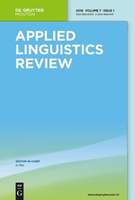
Applied Linguistics Review
Advancing the frontiers of language research.Applied Linguistics Review is a leading academic journal published by WALTER DE GRUYTER GMBH, focusing on the dynamic field of linguistics and language studies. With an impressive Q1 quartile ranking in both Linguistics and Language and Social Sciences, the journal positions itself at the forefront of research, making it a crucial resource for scholars and professionals alike. The journal aims to foster scholarly dialogue by publishing high-quality, peer-reviewed articles that explore theoretical frameworks, empirical studies, and innovative methodologies in applied linguistics. Operating from Poland with an international reach, it is committed to advancing knowledge in areas such as language acquisition, language policy, and multilingualism. Its notable performance can be seen in its Scopus rankings, where it stands at #72 out of 1088 in the Arts and Humanities category and #86 out of 1167 in Social Sciences. The Applied Linguistics Review serves as an invaluable platform for researchers, educators, and students to disseminate and engage with cutting-edge research, thereby enhancing their understanding and application of linguistic principles in diverse contexts.

Philologica Canariensia
Cultivating global perspectives in literary theory and linguistics.Philologica Canariensia is a distinguished academic journal published by the University of Las Palmas de Gran Canaria, focusing on the vibrant fields of Literature and Literary Theory as well as Linguistics and Language. With an impact factor that positions it in the Q1 and Q2 quartiles in its respective categories as of 2023, the journal has established itself as an important platform for scholarly communication and research. Since transitioning to Open Access in 2014, it has broadened its reach, allowing researchers, professionals, and students from around the globe to access high-quality publications without barriers. With a commendable presence in Scopus rankings, including a rank of #309 out of 1106 in Literature and Literary Theory, Philologica Canariensia aims to foster an interdisciplinary dialogue and advance knowledge in the humanities. The journal's commitment to publishing innovative research makes it an essential resource for anyone engaged in exploring linguistic and literary phenomena.

RILCE-Revista de Filologia Hispanica
Elevating Academic Discourse in Linguistics and LiteratureRILCE-Revista de Filologia Hispanica is a distinguished academic journal published by the Universidad de Navarra, serving as a pivotal platform for scholarship in the field of Hispanic Philology. Established in 2008 and ongoing through 2024, RILCE stands out in the academic community with a robust reputation reflected in its 2023 ranking; it holds Q2 status in Linguistics and Language and Q1 in Literature and Literary Theory. The journal is indexed in Scopus, where it ranks 165th out of 1106 in Literature and Literary Theory, showcasing its significant impact with an 84th percentile ranking. Located in Pamplona, Spain, RILCE aims to foster critical dialogues and disseminate innovative research that advances the understanding of linguistic and literary studies, making it an essential resource for researchers, professionals, and students alike. Although specific open access options may be limited, RILCE remains committed to enriching the academic dialogue within its disciplines.
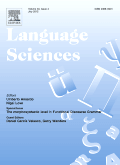
LANGUAGE SCIENCES
Unraveling the Complexities of CommunicationLANGUAGE SCIENCES, published by Elsevier Science Ltd, stands as a prominent journal in the field of linguistics and language studies. With an impressive impact factor that solidifies its reputation, it holds a Q1 ranking in both the linguistics and language categories for 2023, reflecting its excellence and relevance in cutting-edge research. Since its inception in 1979, this journal has evolved to encompass a wide range of interdisciplinary studies, providing a platform for innovative research that addresses the complexities of language use, acquisition, cognition, and social interactions. The journal is hosted in the United Kingdom and features rigorous peer-reviewed articles that contribute significantly to both the academic community and practical applications in language-related fields. With access options tailored for a diverse range of readers and contributors, LANGUAGE SCIENCES invites scholars, students, and professionals to engage with its comprehensive body of work and contribute to the ongoing discourse in linguistics.

Dacoromania
Unlocking innovative research for a global audience.Dacoromania, published by the esteemed EDITURA ACAD ROMANE, is an Open Access academic journal that has been contributing to the fields of Linguistics, Language, Literature, and Literary Theory since 2011. With a mission to foster scholarly dialogue and facilitate knowledge dissemination, the journal enables researchers, professionals, and students to access a wealth of innovative research and critical scholarship without barriers. Although currently classified in the Q4 quartile for its categories in Linguistics and Literature, Dacoromania aspires to enhance its visibility and impact within these disciplines, providing a platform for emerging voices and ideas from Romania and beyond. The journal is openly accessible and invites submissions that push the boundaries of linguistic and literary studies, ensuring a vibrant exchange of thought in a rapidly evolving academic landscape.

Rasprave
Illuminating the complexities of language and communication.Rasprave is a distinguished open access journal published by the Institute of Croatian Language and Linguistics in Croatia, dedicated to advancing the field of linguistics and language studies. With an ISSN of 1331-6745 and E-ISSN 1849-0379, the journal has embraced open access since 2007, making its research widely available to scholars globally. It holds an important position in the academic community, particularly noted for its 2023 Scopus ranking within the Arts and Humanities and Social Sciences categories, falling into the 59th and 56th percentiles respectively. The journal’s impact is further reflected in its Q3 quartile ranking in linguistic and language studies, showcasing its relevance and growing influence in this vibrant field. Rasprave aims to publish innovative research that deepens understanding of language dynamics, linguistic theory, and sociolinguistics, making it an essential resource for researchers, professionals, and students seeking to enrich their knowledge and contribute to the academic discourse surrounding language.
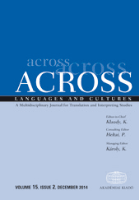
Across Languages and Cultures
Cultivating Multidisciplinary Perspectives in LinguisticsAcross Languages and Cultures is a leading journal in the field of Linguistics and Language, published by AKADEMIAI KIADO ZRT in Hungary. With its ISSN 1585-1923 and E-ISSN 1588-2519, the journal has established itself as a prominent platform for advancing research and discussion in the dynamics of language across diverse cultural contexts. Its impressive Q1 category ranking indicates its significant influence, with a Scopus rank of #227 in Language and Linguistics, showcasing its robust academic impact (79th percentile). This journal, converging from 2007 to 2024, aims to foster interdisciplinary dialogue and promote innovative research methodologies in multilingual studies. Though not an open-access journal, Across Languages and Cultures provides invaluable insights for researchers, professionals, and students eager to explore the intricacies of language use and its sociocultural implications. Located at Budafoki Ut 187-189-A-3, H-1117 Budapest, Hungary, it continues to serve as an essential resource for those passionate about the linguistic sciences.
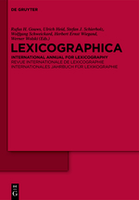
LEXICOGRAPHICA
Innovating the Future of Language DocumentationLEXICOGRAPHICA, published by WALTER DE GRUYTER GMBH, stands as an invaluable resource in the field of linguistics and language studies. With an ISSN of 0175-6206 and an E-ISSN of 1865-9403, this esteemed journal has garnered a solid reputation, reflected in its position within the Q2 quartile for linguistics and language as of 2023. Hailing from Germany, and with a robust publication history spanning from 1996 to 2023, LEXICOGRAPHICA offers a platform for scholarly discourse and innovative research concerning lexicography and its intersections with other linguistic fields. Ranked #442 in Arts and Humanities and #516 in Social Sciences by Scopus, it occupies a pivotal space in academic literature, making it essential reading for researchers, professionals, and students committed to advancing their understanding of language documentation and analysis. Although not open access, the journal’s commitment to high-quality peer-reviewed content ensures that it remains a respected outlet for original research, critical evaluations, and discussions that shape the future of lexicographic studies.

Studia z Filologii Polskiej i Slowianskiej
Pioneering Research in Slavic Linguistic PhenomenaStudia z Filologii Polskiej i Slowianskiej is a prominent journal published by the Polish Academy of Sciences, Institute of Slavic Studies, focusing on the rich and diverse field of linguistics and language studies, particularly within the Slavic context. With the ISSN 0081-7090 and E-ISSN 2392-2435, this open-access journal has been a valuable resource for researchers, professionals, and students since its transition to an open-access model in 2014. It features rigorous peer-reviewed articles that contribute to the understanding of linguistic phenomena and cultural narratives across Slavic languages. Recognized within the Q3 quartile of linguistics and language in 2023, it ranks at the intersection of arts, humanities, and social sciences, providing insights that echo through disciplines such as sociolinguistics, psycholinguistics, and philology. In its ongoing publication trajectory from 2011 to 2023, Studia z Filologii Polskiej i Slowianskiej continues to foster academic discourse and collaboration, positioning itself as a key player in the global linguistic community.
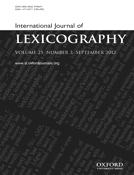
INTERNATIONAL JOURNAL OF LEXICOGRAPHY
Elevating the Standards of Lexical ScholarshipINTERNATIONAL JOURNAL OF LEXICOGRAPHY is a leading scholarly platform in the domain of linguistics and language studies, published by Oxford University Press, a renowned publisher known for its contributions to academic excellence. With an ISSN of 0950-3846 and E-ISSN 1477-4577, the journal has established a robust international presence since its inception in 1988, converging its scholarly reach and insights for over three decades. The journal is highly regarded within its field, currently holding a prominent Q2 quartile ranking in Linguistics and Language and ranking #200 out of 1088 in the Scopus database within the Arts and Humanities domain, which places it in the 81st percentile of its category. Although the journal does not offer open access, it remains an invaluable resource for researchers, professionals, and students dedicated to advancing the study of lexicography. Key objectives of the journal include fostering innovative research, facilitating interdisciplinary dialogue, and providing a forum for the dissemination of significant findings contributing to lexicon development and language use worldwide. The INTERNATIONAL JOURNAL OF LEXICOGRAPHY serves as a vital conduit for scholarly discussions, ensuring that critical insights and discussions in lexicography continue to thrive in the academic landscape.